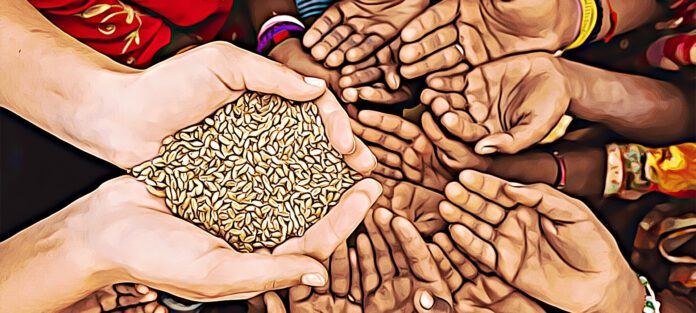Pakistan has a problem. In an international ranking of the Global Hunger Index (GHI) this year, the country ranked 92 out of 116 nations, with its hunger categorised as ‘serious.’ Pakistan currently faces a scenario in which it is largely food sufficient but not food secure.
Despite Pakistan being ranked at 8th in producing wheat, 10th in rice, 5th in sugarcane, and 4th in milk production, a 2019 report of the State Bank of Pakistan (SBP) showed that nearly 37% of households in Pakistan are food insecure. In the three years since the SBP’s report, matters have only worsened. Food price inflation in Pakistan has been in double digits since August 2019. The cost of food has been 10.4-19.5% higher than the previous year in urban areas and 12.6-23.8% in rural areas, according to figures published by the Pakistan Bureau of Statistics.
So how does a country with one of the largest agrarian economies in the world find itself unable to sufficiently provide food for nearly 40% of its population? For decades, agriculture has been neglected and people’s earnings have been hit by one economic crisis after another. On top of this, particularly in the past decade or so, climate change related disasters and changes in the environment have resulted in our already neglected agriculture becoming less competitive. The content in this publication is expensive to produce. But unlike other journalistic outfits, business publications have to cover the very organizations that directly give them advertisements. Hence, this large source of revenue, which is the lifeblood of other media houses, is severely compromised on account of Profit’s no-compromise policy when it comes to our reporting. No wonder, Profit has lost multiple ad deals, worth tens of millions of rupees, due to stories that held big businesses to account. Hence, for our work to continue unfettered, it must be supported by discerning readers who know the value of quality business journalism, not just for the economy but for the society as a whole.To read the full article, subscribe and support independent business journalism in Pakistan










There are many companies in Pakistan carrying modern technology for cost-effective services and have been developing the required expertise to serve the Pakistani farmers’ community in a highly effective manner however they are not encouraged on high levels to make a difference however some organisations are going beyond and providing complete agricultural solutions through products and farm advisory services and offering expert guidance for excellent yields
“Pakistan is food sufficient but not food secure”. I expected this article to provide the underlying reason for this disparity. However, the article have defined it in just one word “i.e. neglected agriculture”. We expect more to know since the neglected agriculture we all know this is the problem. What exactly is neglected would be of more concerning for us to know.
Pakistan is not on 92 but 99 on the global hunger index.
I have read so many content about the blogger lovers however this article is truly a nice paragraph, keep it up.
온라인 카지노
j9korea.com/
Agriculture is suffering because of a very skewed economic structure which benefits the extremely rich feudal elite of the country. According to govt data, only 5% rural households control 64% of agricultural land. And its well known that this elite while amassing super profits is exempted from tax. Equitable distribution of land, and self-reliant agriculture production would be a big step in addressing the food and climate crisis in the country